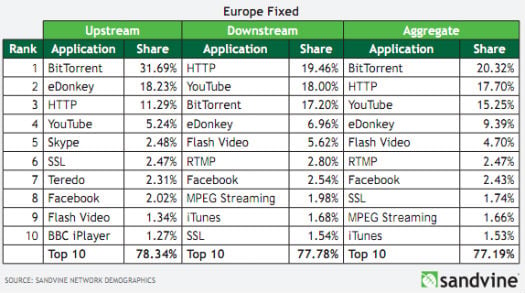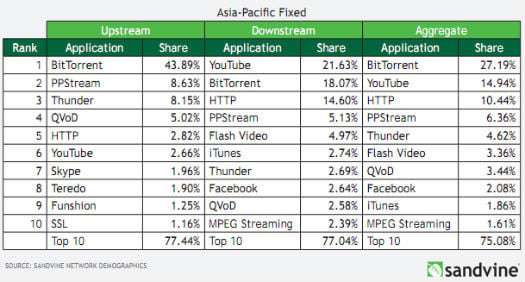TorrentFreak Email Update |
- FilesTube Tops Google Copyright Takedown List
- BitTorrent Traffic Booms Due to “Licensing Challenges”
- Italian Court Orders All ISPs To Block KickAssTorrents
| FilesTube Tops Google Copyright Takedown List Posted: 25 May 2012 03:08 AM PDT
To give the public insight into the scope and nature of this process Google has decided to publish all takedown requests online as part of their transparency report. “Specifically, we're disclosing the number of requests we get from copyright owners and the organizations that represent them to remove Google Search results because they allegedly link to infringing content,” Google states. “We're starting with search because we remove more results in response to copyright removal notices than for any other reason. So we're providing information about who sends us copyright removal notices, how often, on behalf of which copyright owners and for which websites.” The data shows that Google receives by far the most takedown requests for fellow search engine FilesTube. During the last month they disabled access to 43,469 links after being notified by 233 copyright holders. During the last year Google disabled access to 389,512 FilesTube links, twice as many when compared to the 147,318 links from runner-up Torrentz.eu. Google takedowns for FilesTube
The above is interesting because FilesTube, in common with many other sites in the top list, honors DMCA takedown requests itself. FilesTube owner Arkadiusz Senko told TorrentFreak that he is surprised to see his site at the top of the list, and confirmed that his company also works directly with copyright holders to remove infringing content. In fact, FilesTube informs TorrentFreak that they remove 2,000,000 links per month from their search index, which is more than Google. These links are removed within 24-hours and FilesTube also adds several filters per day to make sure content with specific infringing file names doesn’t later reappear. While many of the takedown requests are valid, Google’s data reveals that in some cases the DMCA is abused to apply broad and unwarranted censorship. In this notice, for example, NBC Universal asked Google to block access to a search on FilesTube for the word “battleships,” a term that does not exclusively link to NBC content. Looking further down the list of targeted domains we see The Pirate Bay listed in 13th place. And because of the Pirate Bay blockades in the UK, the Netherlands and elsewhere, several reverse proxy sites including those of the UK and Dutch Pirate Party are also listed. Steve Wilson, head of Pirate Party UK’s IT Team, responded by pointing out that removing Google’s search results doesn’t do anything to prevent the actual content from being shared. “Obviously the removal of search results does not remove the linked content and all of that content is still searchable through the Pirate Bay’s own search page. The linked content itself doesn’t relate directly to material owned by the copyright holder either, but is rather a further link to content held across many computers and accessible via a peer-to-peer network,” Wilson told TorrentFreak. Google’s data further reveals the Microsoft is the most active copyright holder when it comes to sending takedown notices. The software giant asked Google to block access to a total of 2,544,209 links during the last year, and is followed by NBC Universal and the RIAA with 985,995 and 416,731 targeted links respectively. One of the reasons why Google made the data public is to aid the ongoing discussions on how online piracy should be addressed. And as we will reveal later today, there’s plenty of discussion possible, especially about some borderline insane takedown requests that reveal how copyright holders sometimes shoot themselves in the foot. Source: FilesTube Tops Google Copyright Takedown List |
| BitTorrent Traffic Booms Due to “Licensing Challenges” Posted: 24 May 2012 02:02 PM PDT Over the years we have been following various reports on Internet traffic changes, specifically in relation to BitTorrent. One of the emerging trends is BitTorrent and P2P traffic as a whole losing its share of total Internet traffic, in the U.S. at least. This downward spiral is confirmed by a recent Sandvine report which reveals that BitTorrent traffic is now responsible for 11.3% of all U.S. Internet traffic during peak hours, compared to 17.3% last year. Although these numbers don’t take into account that absolute traffic has increased, it’s clear that there’s little to no growth in BitTorrent use. However, this decline appears to be unique to the U.S. When we look at other regions a different pattern can be observed. In Europe for example, BitTorrent traffic still accounts for 20.32% of all Internet traffic during peak hours, while eDonkey adds another 9.39% to the P2P total. During the last 18 months the share of P2P traffic nearly quadrupled, and this increase is even larger in absolute traffic. According to Sandvine, the absence of legal alternatives is one of the reasons for these high P2P traffic shares. “We see higher levels of P2P filesharing than in many other regions, at least partially due to geographical licensing challenges that restrict the availability of legitimate Real-Time Entertainment services.” Europe: Internet traffic during peak hours
A similar trend is visible in the Asia-Pacific region where BitTorrent now accounts for nearly half of all upstream traffic and 27.19% of the aggregate Internet traffic during peak hours. The P2P streaming service PPStream and the Chinese file-sharing client Thunder add another 6.36% and 4.62% to the P2P total. Asia-Pacific: Internet traffic during peak hours
So, while BitTorrent traffic is stabilizing in the U.S. as its share of Internet traffic drops, the P2P protocol is still hugely popular in other parts of the world. Sandvine’s suggestion that a lack of legal alternatives is one of the explanations for this seems plausible. As we reported earlier this week, the latest episodes of series such as Game of Thrones are widely pirated on BitTorrent in countries such as Australia and the Netherlands due to airing delays. In the U.S. on the other hand, the availability of legal content has flourished in recent years. To illustrate this, Sandvine reports that one-third (32.9%) of all downstream traffic during peak hours is now generated by Netflix subscribers. In addition, Hulu has doubled its share in the last year to 1.8%. The above seems to suggest that due to these alternatives, people are less inclined to pirate. The MPAA is slowly starting to realize that consumers are not all out to steal content, they simply want to consume. “I believe it's critical to find solutions to the challenges facing both these consumers and the people who create the content. Because at the end of the day, this discussion is about consumers and by consumers who love TV shows and movies. They want to be able to access them quickly and safely online,” the MPAA’s Marc Miller wrote yesterday. True words, but Miller continues with a classic misunderstanding. “No business in the world can compete with ‘free’,” he notes. As it turns out, the entertainment industry can definitely compete with free, up to a certain point. The crucial part is to remove all the artificial barriers. Release delays for TV and movies drive people towards BitTorrent piracy, just as DRM is an incentive to pirate rather than a deterrent. The challenge for the entertainment industry in the years to come is not to invent ways to stop piracy but to make it less attractive, by ensuring that consumers get timely access to the content they want independent of their location, and on demand. Source: BitTorrent Traffic Booms Due to “Licensing Challenges” |
| Italian Court Orders All ISPs To Block KickAssTorrents Posted: 24 May 2012 08:41 AM PDT
Founded just three years ago in 2009, KickAssTorrents has shown that it’s serious about becoming a leading torrent site player. Of course, that has its drawbacks too. The site’s increasing profile has caused it to appear in numerous MPAA, RIAA and government reports, in the US and elsewhere. News today reveals that the authorities in Italy have been watching the site for some time. According to a report coming out of the police department with responsibilities for tackling cybercrime, KickAssTorrents will soon be subjected to a nationwide ISP blockade. Translated as "Financial Guard", the Guardia di Finanza (GdF) is a department under Italy's Minister of Economy and Finance. Part of the Italian Armed Forces, GdF has in recent years been involved in many file-sharing investigations, most recently against KickAssTorrents. Operation ‘Last Paradise’ has just concluded with the public prosecutor of the Sardinian capital Cagliari granting an “order of inhibition” which requires the country’s ISPs to cease providing access to the site. Similar orders were previously granted against The Pirate Bay and the now-defunct BTjunkie. “This is another memorable dark day for digital piracy in Italy. After starting with The Pirate Bay in 2008 and the final closing of the doors at BTjunkie in February 2012, the Guardia di Finanza has targeted another super-pirate platform, virtually located in the Philippines and servers scattered around the world,” GdF said in a statement. “This colossal site of 10 million active torrents receives over 3 million visits daily from all over the world and Italy was the third most popular country of origin for users behind only India and the USA.” GdF adds that by their estimates, KickAssTorrents generates $8.5 million per year from advertising and other revenue. “This international platform has long been targeted by U.S. authorities as one of the worst sites for the illegal distribution of music,” said Enzo Mazza, chief of FIMI, Italy’s answer to the RIAA. “The intervention of the Italian authorities was very important, especially for the protection of legal music in Italy, which now represents 30% of the market. Platforms such as The Pirate Bay, BTjunkie and KickAssTorrents are run by criminal organizations that make millions from advertising.” Responding to the news, Italian lawyer Giovanni Battista Gallus told TorrentFreak that unlike The Pirate Bay blockade, there is no “proper” court order for the current blockade. This also happened with the BTjunkie block earlier, which was handled by the same prosecutor. “In this case the order has been issued only by the public prosecutor, without any judicial intervention,” he said. “I have serious doubts whether this is appropriate under Italian criminal procedure law, and I’m very curious to see the outcome of an appeal against this order.” The extent of the forthcoming blockade isn’t clear from the information currently being released. However, the GdF statement specifically mentions kickasstorrents.com, a domain the site left behind when it switched to Kat.ph in April 2011. Update: FIMI boss Enzo Mazza confirmed to TorrentFreak that both the old and new domains and IP-addresses will be blocked, and added the following message. “The investigation into the criminal organization behind the site is still making progress and the public prosecutor is in touch with the authorities in the countries involved in the case. The case is followed by the Fiscal police who are usually investigating Italian mafia bosses. This means they are well equipped to take the members of the KAT gang to justice.” Source: Italian Court Orders All ISPs To Block KickAssTorrents |
| You are subscribed to email updates from TorrentFreak To stop receiving these emails, you may unsubscribe now. | Email delivery powered by Google |
| Google Inc., 20 West Kinzie, Chicago IL USA 60610 | |


 Under the DMCA copyright holders have the right to demand that websites disable access to infringing content. One of the top recipients of these notices is without a doubt Google.
Under the DMCA copyright holders have the right to demand that websites disable access to infringing content. One of the top recipients of these notices is without a doubt Google. 



 Early this year TorrentFreak published a
Early this year TorrentFreak published a
No comments:
Post a Comment